Who is Edward Lord?
Can a person who accuses everyone who disagrees with radical gender ideology of “transphobia” be the right person to hear a case about discrimination for gender-critical belief?
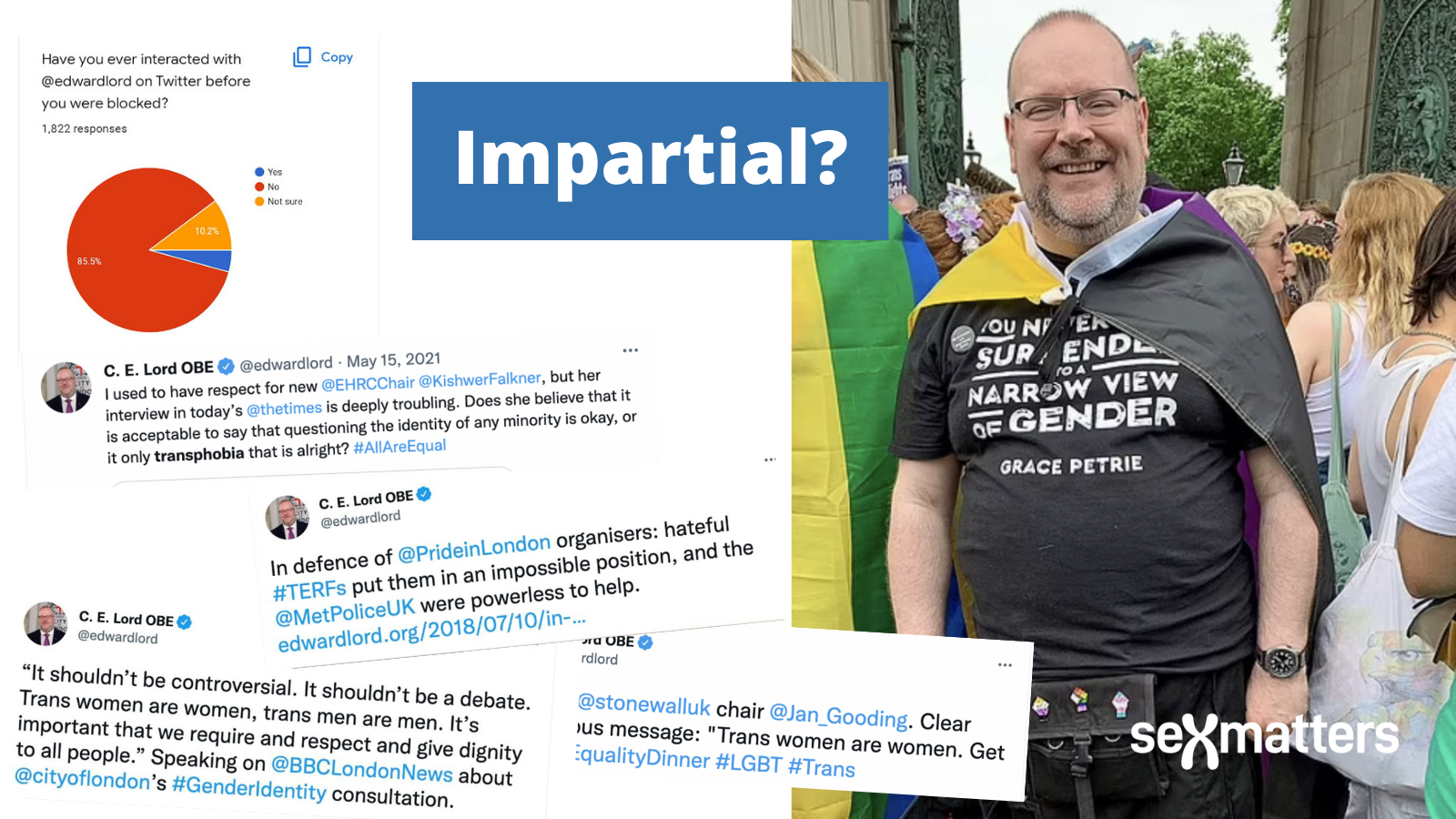
The Daily Mail reports that City of London politician Edward Lord is one of the two lay members for the Employment Appeal Tribunal appeal in the case of Kristie Higgs.
Higgs is a school pastoral assistant who lost her job after sharing a petition on Facebook against extending sex and relationship education. Her lawyers have applied for Edward Lord to be recused from the case; Lord has declined. There is a hearing on this on Wednesday.
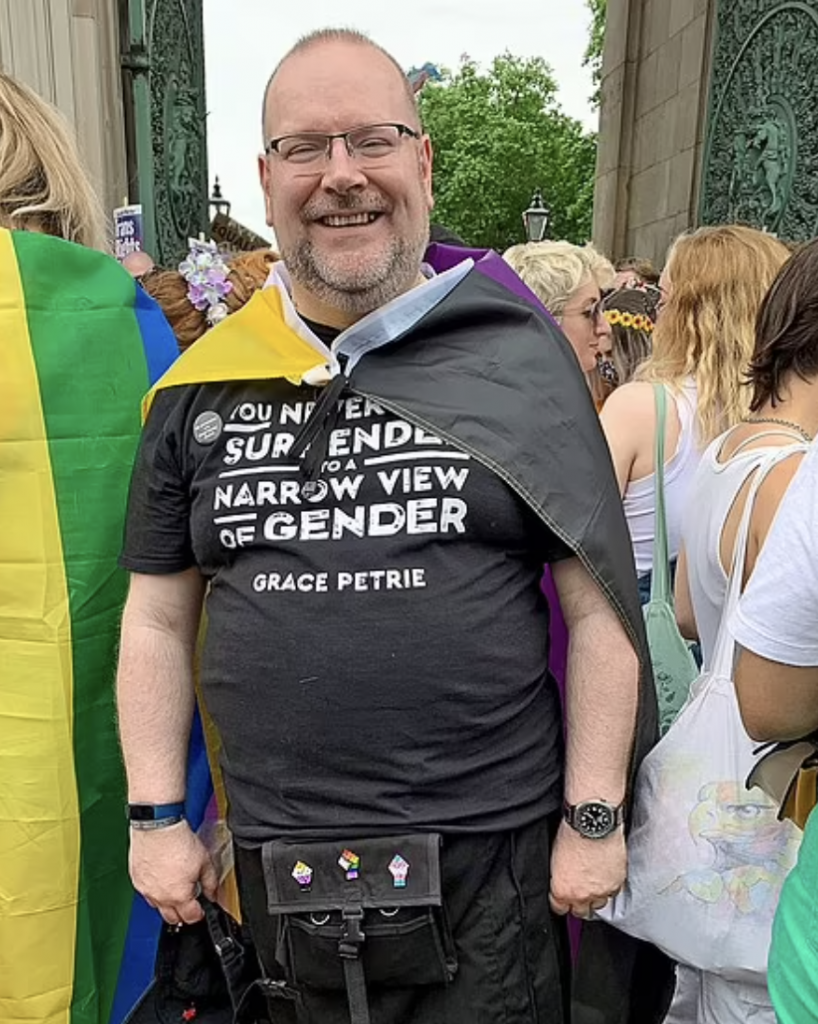
Edward Lord has been an elected member of the City of London Corporation since 2001, chairing various committees, and acting leading member at the Local Government Association from 2004 to 2017, as well as holding other public and private non-executive roles. Lord, who identifies as bi and trans non-binary, was LGA’s national lead on equality from 2004 to 2013; a board member of the Pride Trust; deputy/acting chair of Pride in London’s community advisory board; and an “LGBT role model” for Stonewall, and is currently a Trustee of the LGBT Foundation. Lord has also sat as a Justice of the Peace since 2002, both in the magistrates’ courts in the Cities of London and Westminster and in the appellate jurisdiction at the Central Criminal Court (Old Bailey) and Southwark Crown Court. Since July 2021, Lord has served as a lay member of the Employment Appeal Tribunal.
Can Edward Lord do right to Kristie Higgs?
Non-legal members of the employment tribunal sit alongside the judge and represent employer and employee perspectives. Their involvement is intended to support and demonstrate impartiality. They swear to “do right to all manner of people after the laws and usages of this realm, without fear or favour, affection or ill will”.
Kristie Higgs’ case is that she was directly discriminated against and harassed for her lack of belief in “gender fluidity” and her belief in Genesis 1:27 – “God created man in His own image, in the image of God He created him; male and female He created them.” Her beliefs are a religious counterpart to secular “gender-critical” views, and there is no doubt that they are “worthy of respect in a democratic society”. She also holds traditional religious views of marriage. This is clearly a protected belief and is explicitly accommodated in the Equality Act.
But the original tribunal found that she was dismissed:
“Not on the ground of the beliefs but rather for a completely different reason, namely that as a result of her actions she might reasonably be perceived as holding beliefs that would not qualify for protection within the Equality Act (and, as we say, beliefs that she denied having).”
“The act of which we concluded Mrs Higgs was accused and eventually found guilty was posting items on Facebook that might reasonably lead people who read her posts to conclude that she was homophobic and transphobic.”
The EAT judgment in Forstater and the judgments in the Harry Miller case established not only that gender-critical beliefs and their expression are protected under the Equality Act 2010 S.10, Articles 9 and 10 of the European Convention on Human Rights and Fundamental Freedoms (ECHR), but also that “those beliefs are not inherently bigoted or transphobic, and indeed reflect the position under English law”.
Dame Victoria Sharp recognised in the Harry Miller Court of Appeal ruling that gender-critical people should be regarded as:
“a group of people who could easily be stigmatised for their opinions and be subject to complaints by those offended by [their] views”.
Ben Cooper QC and Anya Palmer have argued in the employment tribunal case of Forstater that it is this which makes people with gender-critical beliefs particularly vulnerable to discrimination: that their expressions are liable to be wrongly stereotyped and stigmatised as bigoted and offensive, although they are in line with the law and material reality (and in Higgs’ case also with the established position of several religions).
Is Edward Lord one of those people likely to stigmatise people with gender-critical views?
There are many examples in the public domain of Edward Lord doing exactly this, including some acting in an official capacity:
- On sex and gender, Lord supports the Stonewall position that “trans women are women, get over it”
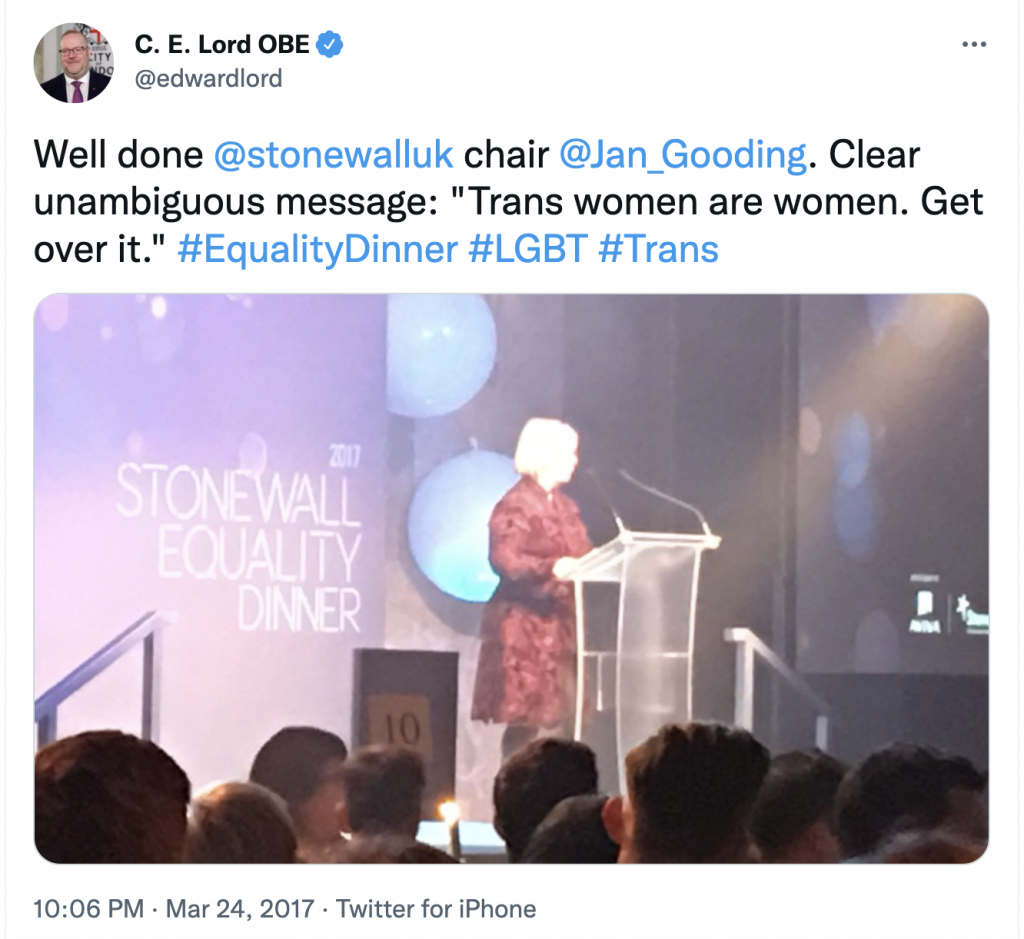
- Lord called lesbians who protested to be able to identify lesbianism as same-sex attraction “man-hating-trans-hating bigots”.
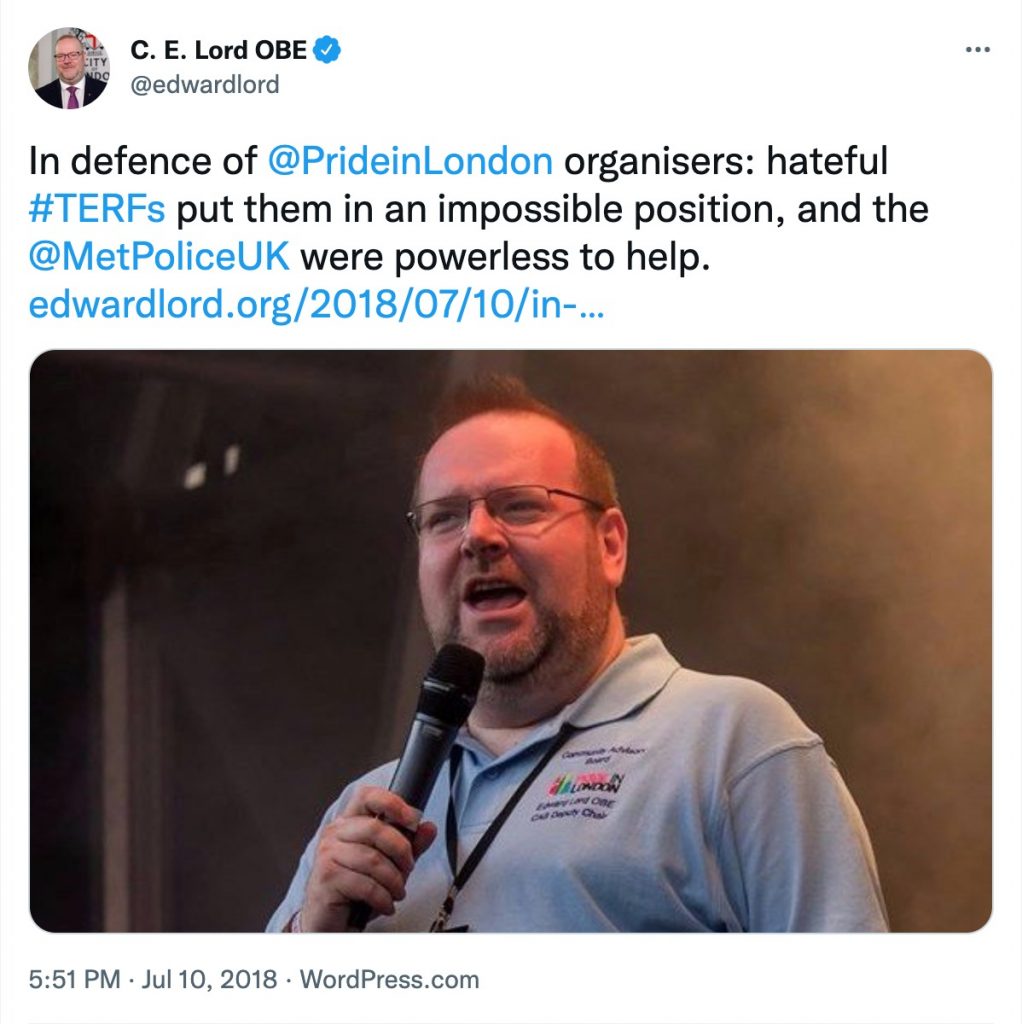
When a group of lesbian feminists protested during the Pride parade in London in 2018 against pressure being put on lesbians to accept trans-identifying males as sexual partners, Lord wrote a blog post calling their message “nothing short of man-hating, trans-hating bigoted bunkum” and “abhorrent”.
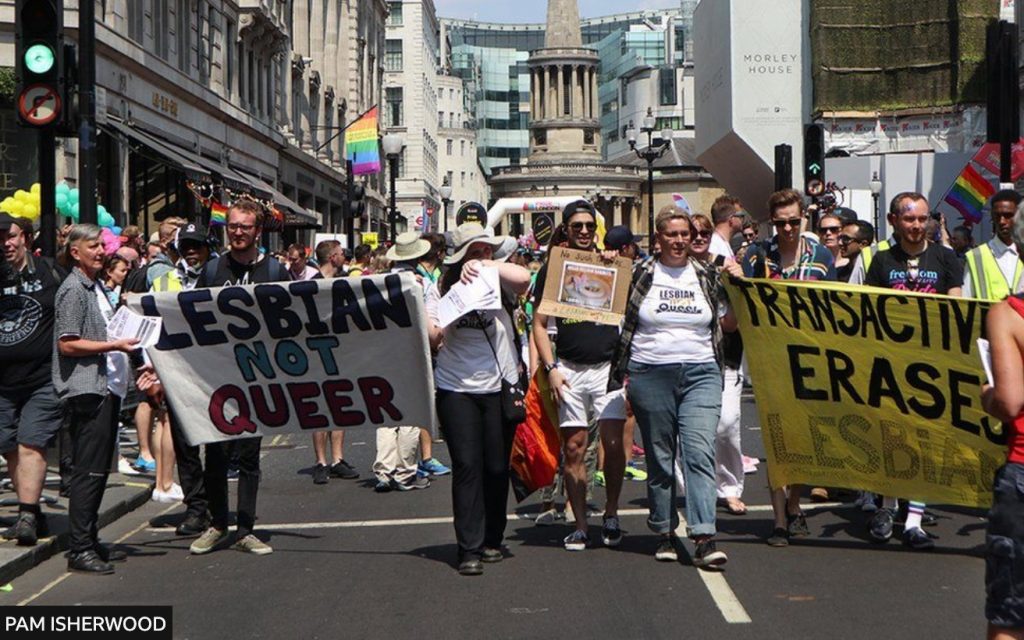
Lord said “I was angered by their message of hatred and bigotry.” On Twitter Lord called them hateful TERFs. (“TERF” is a slur associated with threats of violence against gender-critical women.)
Lord has written about feeling sexual attraction to lesbians:
“Oh, how I would long for the soft masculinity of those beautiful butch dykes. But it was not to be. The politics of our community back then was very clear. Lesbian and gay good, bisexual bad, and trans invisible and unwanted.”
- As a trustee of the LGBT Foundation, Lord actively supported legal action to have the LGB Alliance’s charitable status removed, calling them “a fringe group fuelled by transphobia”.
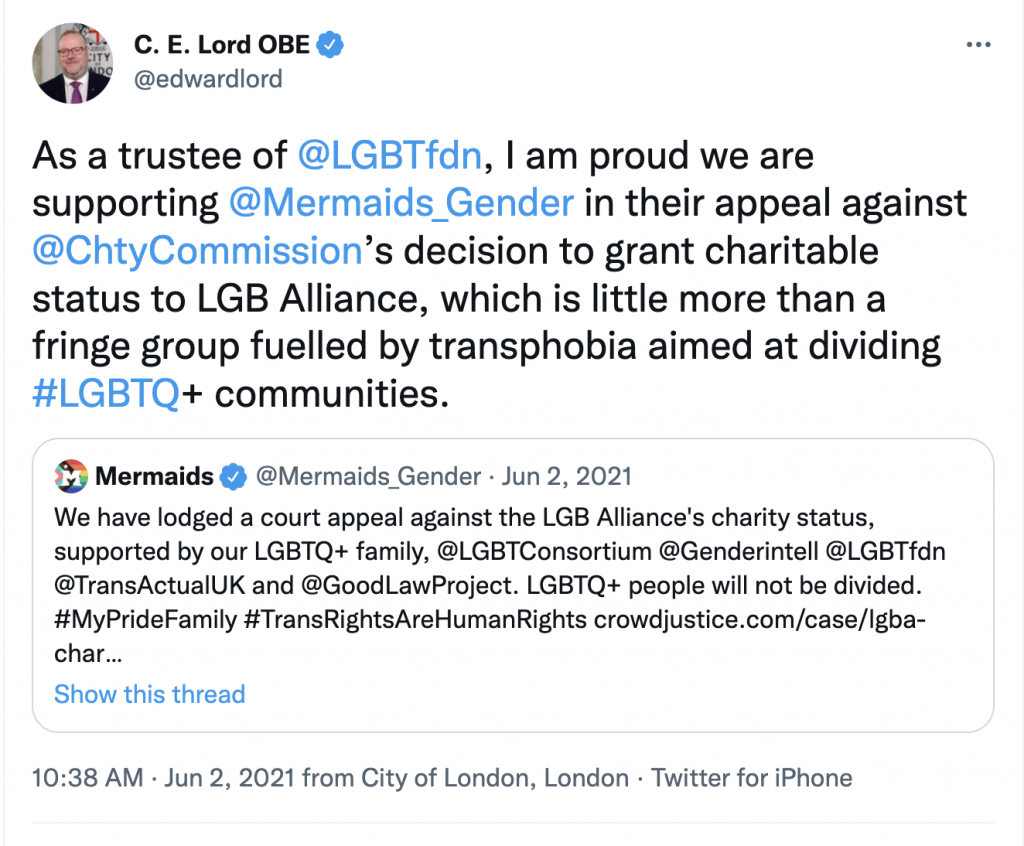
- Lord argues that trans-identifying people have the right to use opposite-sex facilities, and that women cannot have legitimate objections to sharing toilets and changing rooms with males. In 2018 Lord oversaw a consultation by the Corporation of London about its trans policy (including in relation to women’s and men’s ponds and changing rooms on Hampstead Heath and toilets at the Barbican). Launching the consultation, Lord said: “It shouldn’t be controversial. It shouldn’t be a debate. Trans women are women, trans men are men.”
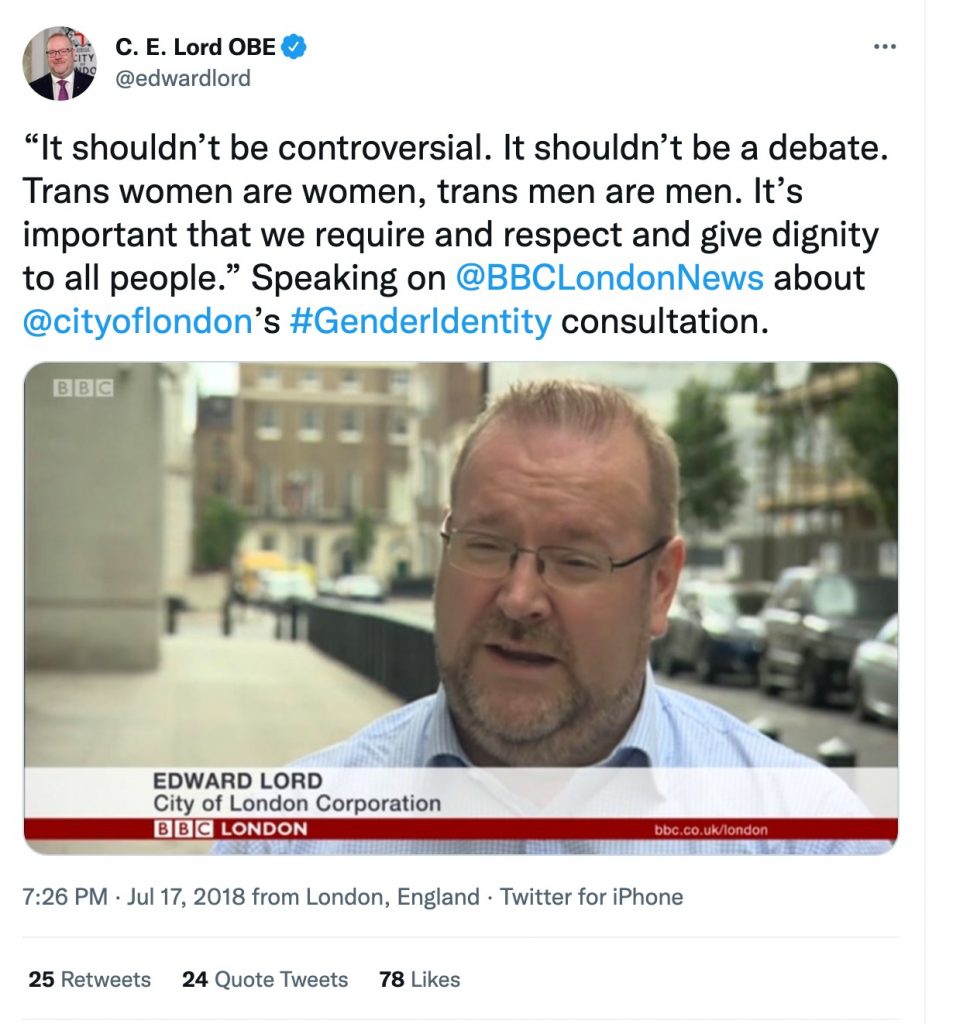
- Lord calls those who object to single-sex services being operated on the basis of gender self-ID “anti-trans” and “bigots”. In June 2018 Lord congratulated Minister Penny Mordaunt who compared concerns about with single-sex services with “1980s homophobia”.
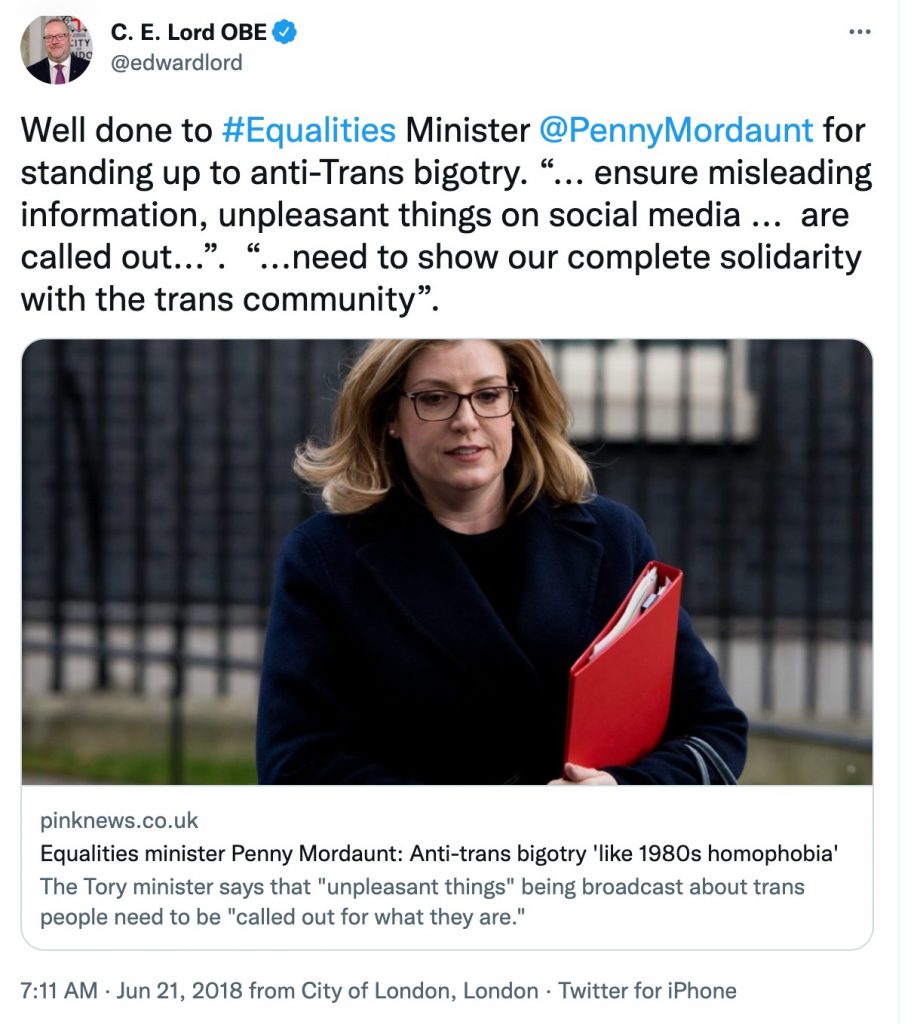
In 2020 Lord wrote a “cautionary note” to Minister Liz Truss, who had made a statement of support for single-sex services, urging her to change her mind. Lord called those who disagree “a small number of anti-trans advocates”.
- Lord subscribes to an extreme definition of “transphobia” which includes “(i) attempting directly or through advocacy to remove trans people’s rights, (ii) misrepresenting trans people, (iii) abuse of trans people, and (iv) systematically excluding trans people from discussions about issues that directly affect them.” Examples given in the policy include “deadnaming”, “misgendering”, and using phrases such as “biological man” or “biological woman” “to suggest that trans people are a separate category of person from the gender they identify as”.
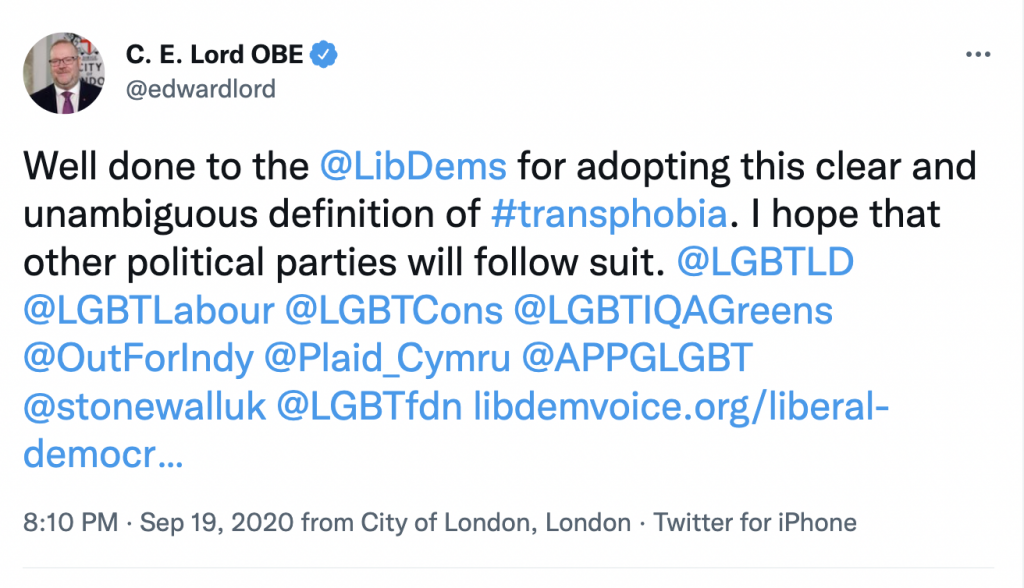
- Edward Lord does not think “gender-critical” beliefs should be protected under S.10 of the Equality Act. Lord is a Trustee of the LGBT Foundation. In May 2021, following the Equality and Human Rights Commission (EHRC) intervention in the Forstater EAT case, the LGBT Foundation was one of those signing an open letter expressing disappointment that the EHRC would intervene ”to say that so-called ‘gender critical’ beliefs should be a protected philosophical belief.” When the EHRC Chair Kishwer Falkner gave an interview to the Times, Edward Lord responded publicly calling gender-critical beliefs “transphobia”.
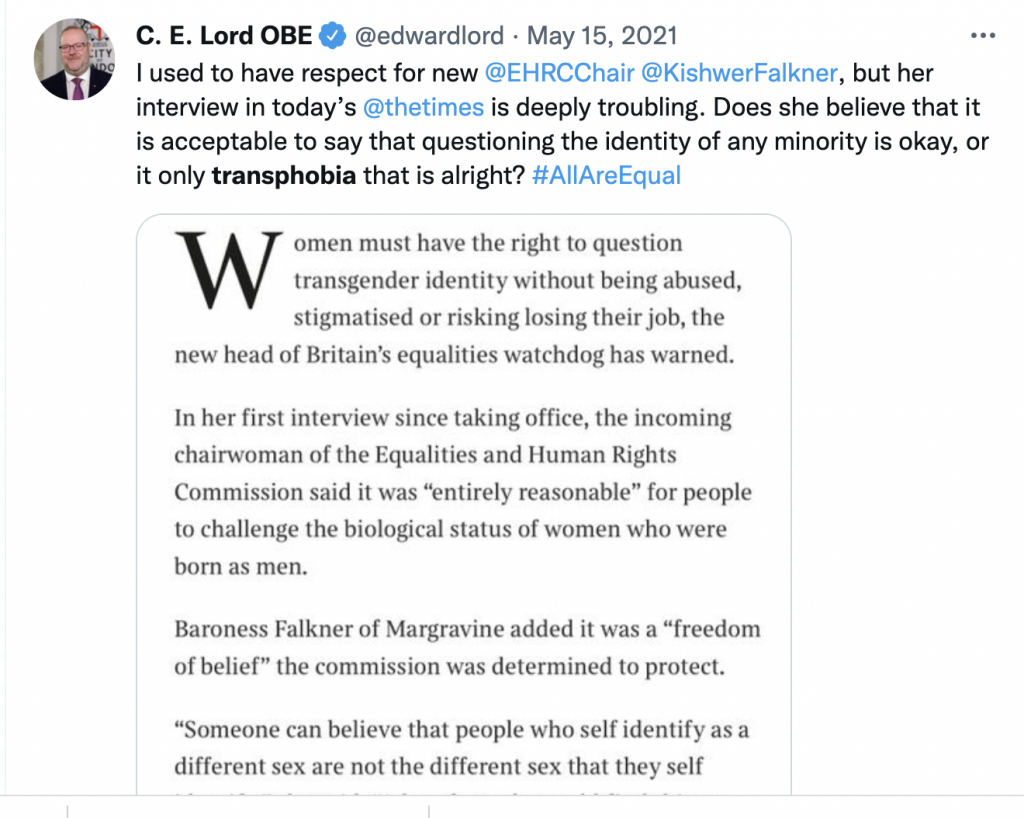
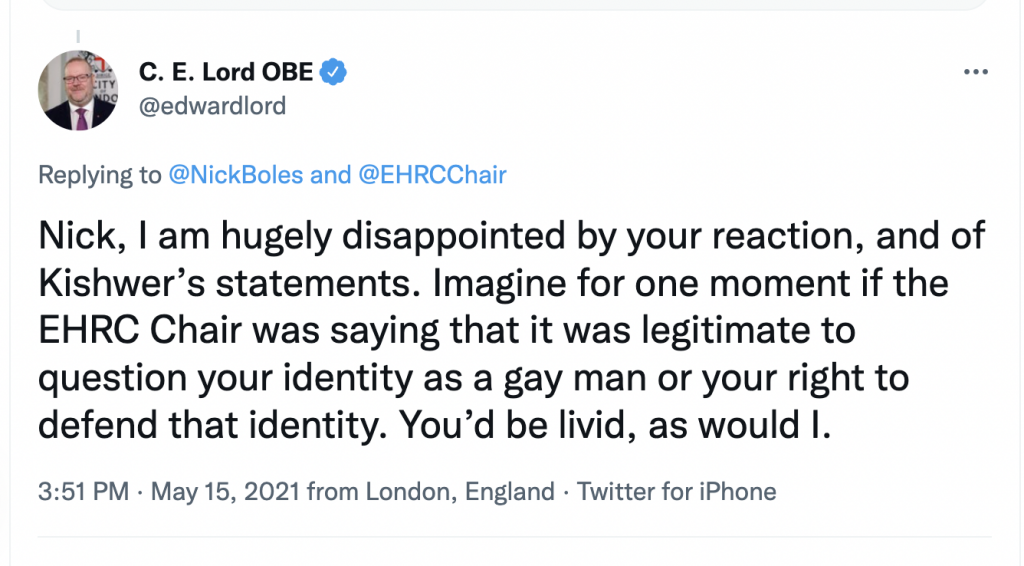
The LGBT Foundation is now calling for the EHRC to lose its international status as a National Human Rights Institution because its new guidance “limits trans people’s rights to spaces and services that match their gender”.
- Lord has sought to have gender-critical views deplatformed from the media and from debates. In December 2019 Lord accused the BBC of becoming a “platform for hatred” of trans people because journalist Justin Webb used the term “biological truth”, which Lord said was insulting.
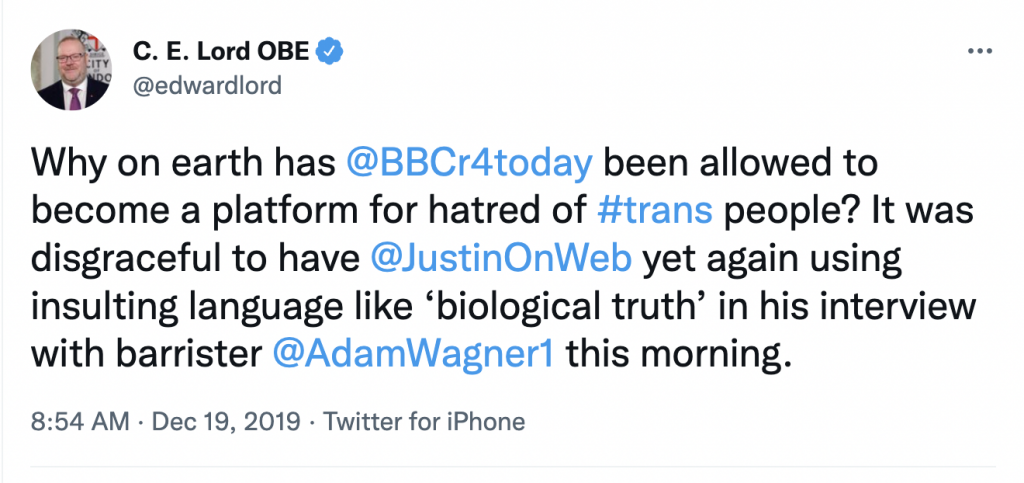
In a blog post the same month Lord accused journalists Andrew Gilligan, Emily Maitlis, Janice Turner and Justin Webb of perpetuating myths “putting at risk the safety of trans people in the UK”.
In October 2021 Lord said the BBC should not feature journalist Sarah Ditum, calling her a “transphobic ‘gender critical’ activist”.
Later in October Lord again berated Justin Webb for “defending notorious trans hater” Professor Kathleen Stock.
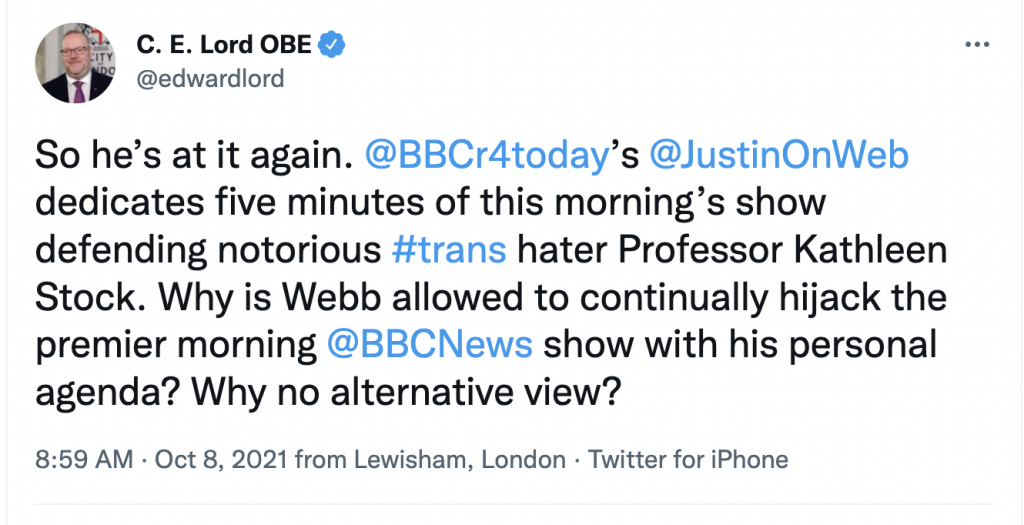
In June 2021 Lord responded to a newspaper article by journalist Sonia Sodha about Stonewall by raising her role on the grants committee of the Trust for London and questioning whether she would give “LGBTQ” applicants a fair hearing.
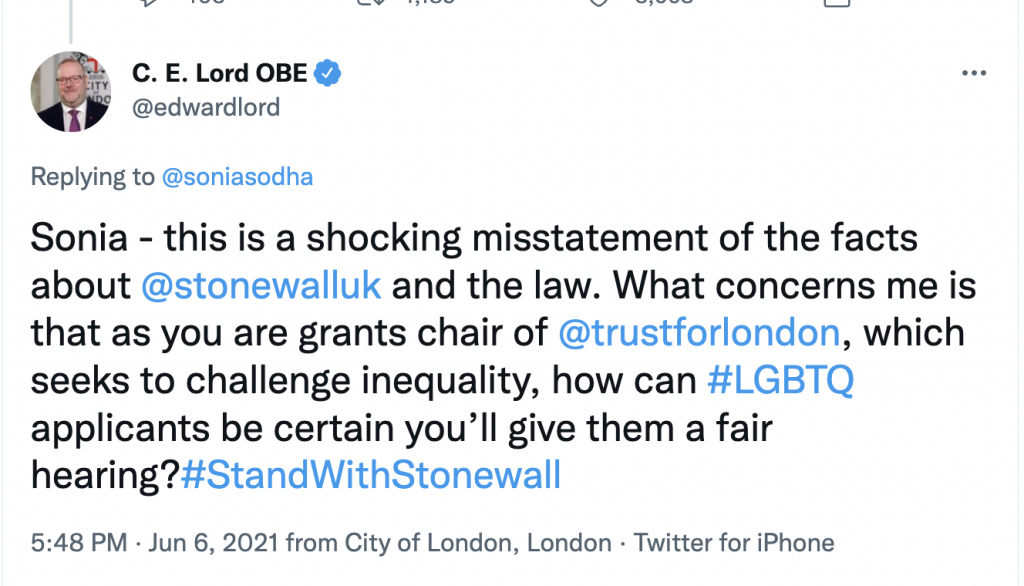
In November 2021 Lord tweeted disappointment that the Middle Temple had invited barrister Naomi Cunningham to speak at an event, calling her a “well known ‘gender critical’ barrister who champions transphobic causes”.
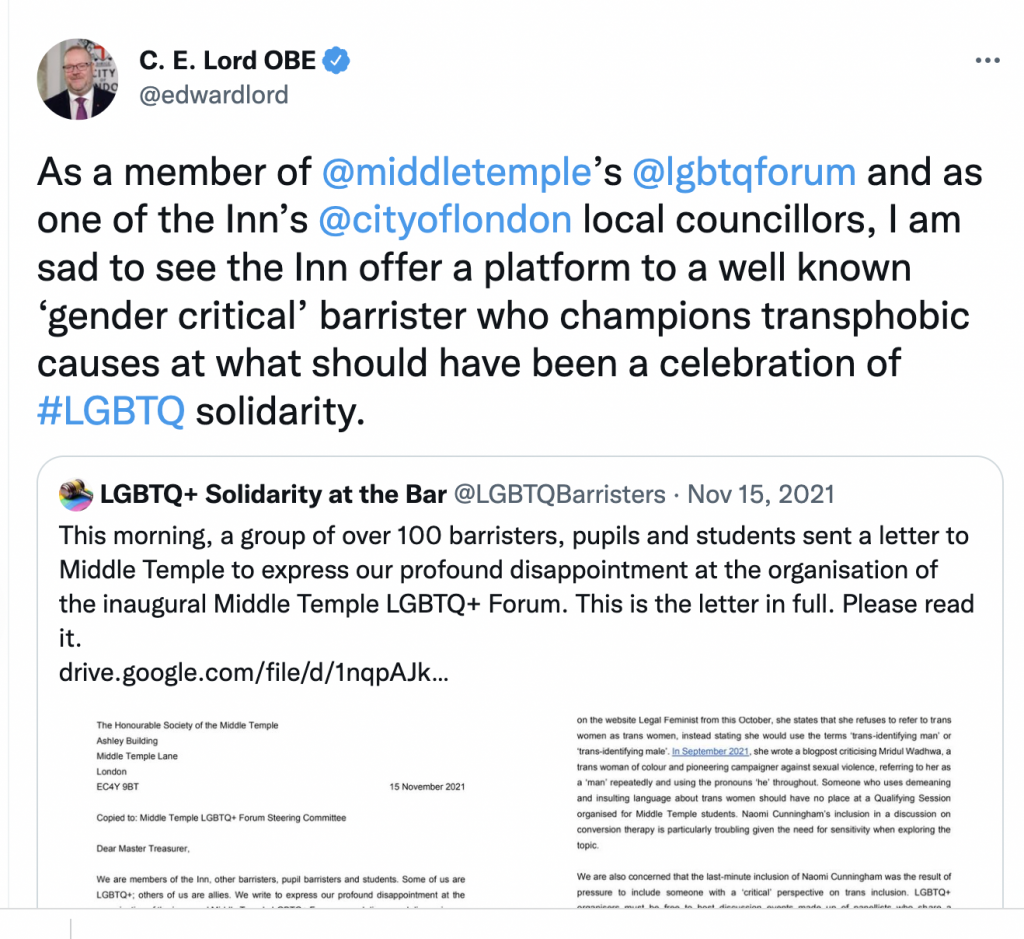
- Edward Lord has blocked thousands of women on Twitter on the basis that they “exclude or deny trans people”. Lord’s pinned tweet since May 2019 has declared this blocking policy.
A survey of people blocked by Lord (carried out in 2019) found that of the 1,822 people who said they had been blocked by Lord, 83% were women. Most of those blocked had not interacted with Lord, but had followed or liked gender-critical tweets (this suggests use of a mass “TERF blocker” block list).
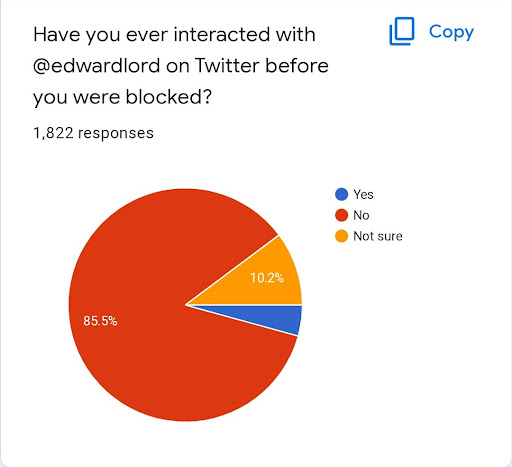
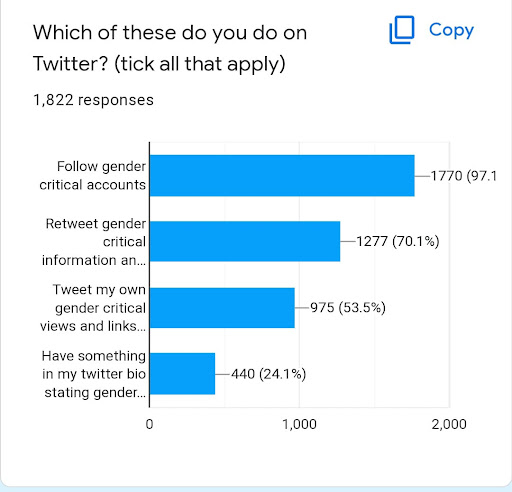
Edward Lord’s tendency to call statements that emphasise that sex matters “transphobia”, “hatred” and “bigotry”, and to seek to close down debate, is exactly the kind of stigmatisation that gender-critical people face.
This tendency should clearly disqualify Edward Lord from sitting in this case, which is about whether Kristie Higgs was unfairly fired because her views were misinterpreted as being transphobic.
Lord has responded to the request for recusal:
“Whilst I do have views on the topics at the heart of the case, and indeed have expressed some of those views publicly but in an entirely private capacity with no reference to my judicial office, I did not consider them grounds for recusal … When exercising judicial office, my decision-making follows the facts of a case and pertinent law and nothing else.”
However, it is clear that Edward Lord’s strongly held personal views on the law around the protected characteristic of gender reassignment and access to single-sex spaces, and around belief discrimination, are pertinent to this case.
Sex Matters has written to the Employment Appeal Tribunal with an emergency request for permission to intervene together with evidence.
